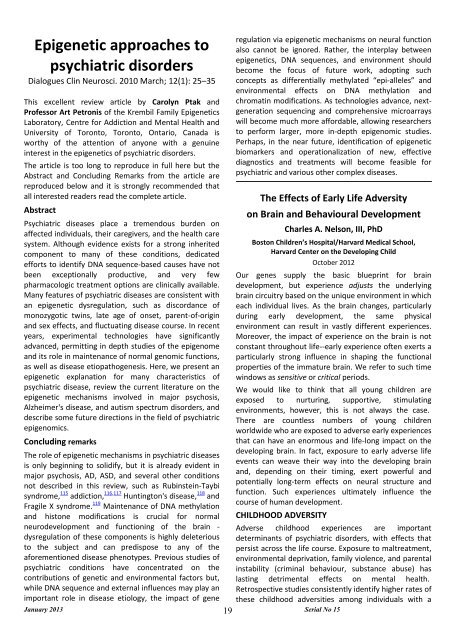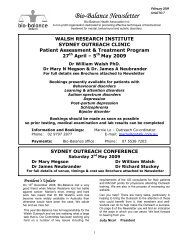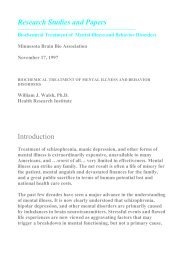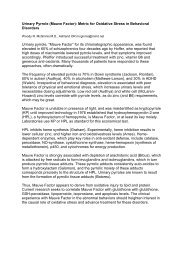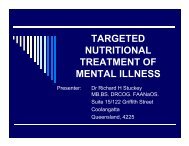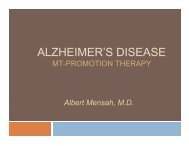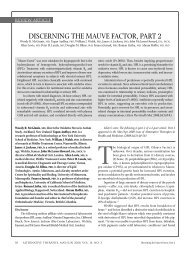Download PDF - Bio-Balance Health
Download PDF - Bio-Balance Health
Download PDF - Bio-Balance Health
- No tags were found...
You also want an ePaper? Increase the reach of your titles
YUMPU automatically turns print PDFs into web optimized ePapers that Google loves.
Epigenetic approaches topsychiatric disordersDialogues Clin Neurosci. 2010 March; 12(1): 25–35This excellent review article by Carolyn Ptak andProfessor Art Petronis of the Krembil Family EpigeneticsLaboratory, Centre for Addiction and Mental <strong>Health</strong> andUniversity of Toronto, Toronto, Ontario, Canada isworthy of the attention of anyone with a genuineinterest in the epigenetics of psychiatric disorders.The article is too long to reproduce in full here but theAbstract and Concluding Remarks from the article arereproduced below and it is strongly recommended thatall interested readers read the complete article.AbstractPsychiatric diseases place a tremendous burden onaffected individuals, their caregivers, and the health caresystem. Although evidence exists for a strong inheritedcomponent to many of these conditions, dedicatedefforts to identify DNA sequence-based causes have notbeen exceptionally productive, and very fewpharmacologic treatment options are clinically available.Many features of psychiatric diseases are consistent withan epigenetic dysregulation, such as discordance ofmonozygotic twins, late age of onset, parent-of-originand sex effects, and fluctuating disease course. In recentyears, experimental technologies have significantlyadvanced, permitting in depth studies of the epigenomeand its role in maintenance of normal genomic functions,as well as disease etiopathogenesis. Here, we present anepigenetic explanation for many characteristics ofpsychiatric disease, review the current literature on theepigenetic mechanisms involved in major psychosis,Alzheimer's disease, and autism spectrum disorders, anddescribe some future directions in the field of psychiatricepigenomics.Concluding remarksThe role of epigenetic mechanisms in psychiatric diseasesis only beginning to solidify, but it is already evident inmajor psychosis, AD, ASD, and several other conditionsnot described in this review, such as Rubinstein-Taybisyndrome, 115 addiction, 116,117 Huntington's disease, 118 andFragile X syndrome. 119 Maintenance of DNA methylationand histone modifications is crucial for normalneurodevelopment and functioning of the brain -dysregulation of these components is highly deleteriousto the subject and can predispose to any of theaforementioned disease phenotypes. Previous studies ofpsychiatric conditions have concentrated on thecontributions of genetic and environmental factors but,while DNA sequence and external influences may play animportant role in disease etiology, the impact of generegulation via epigenetic mechanisms on neural functionalso cannot be ignored. Rather, the interplay betweenepigenetics, DNA sequences, and environment shouldbecome the focus of future work, adopting suchconcepts as differentially methylated “epi-alleles” andenvironmental effects on DNA methylation andchromatin modifications. As technologies advance, nextgenerationsequencing and comprehensive microarrayswill become much more affordable, allowing researchersto perform larger, more in-depth epigenomic studies.Perhaps, in the near future, identification of epigeneticbiomarkers and operationalization of new, effectivediagnostics and treatments will become feasible forpsychiatric and various other complex diseases.The Effects of Early Life Adversityon Brain and Behavioural DevelopmentCharles A. Nelson, III, PhDBoston Children’s Hospital/Harvard Medical School,Harvard Center on the Developing ChildOctober 2012Our genes supply the basic blueprint for braindevelopment, but experience adjusts the underlyingbrain circuitry based on the unique environment in whicheach individual lives. As the brain changes, particularlyduring early development, the same physicalenvironment can result in vastly different experiences.Moreover, the impact of experience on the brain is notconstant throughout life--early experience often exerts aparticularly strong influence in shaping the functionalproperties of the immature brain. We refer to such timewindows as sensitive or critical periods.We would like to think that all young children areexposed to nurturing, supportive, stimulatingenvironments, however, this is not always the case.There are countless numbers of young childrenworldwide who are exposed to adverse early experiencesthat can have an enormous and life-long impact on thedeveloping brain. In fact, exposure to early adverse lifeevents can weave their way into the developing brainand, depending on their timing, exert powerful andpotentially long-term effects on neural structure andfunction. Such experiences ultimately influence thecourse of human development.CHILDHOOD ADVERSITYAdverse childhood experiences are importantdeterminants of psychiatric disorders, with effects thatpersist across the life course. Exposure to maltreatment,environmental deprivation, family violence, and parentalinstability (criminal behaviour, substance abuse) haslasting detrimental effects on mental health.Retrospective studies consistently identify higher rates ofthese childhood adversities among individuals with a19January 2013 Serial No 15


